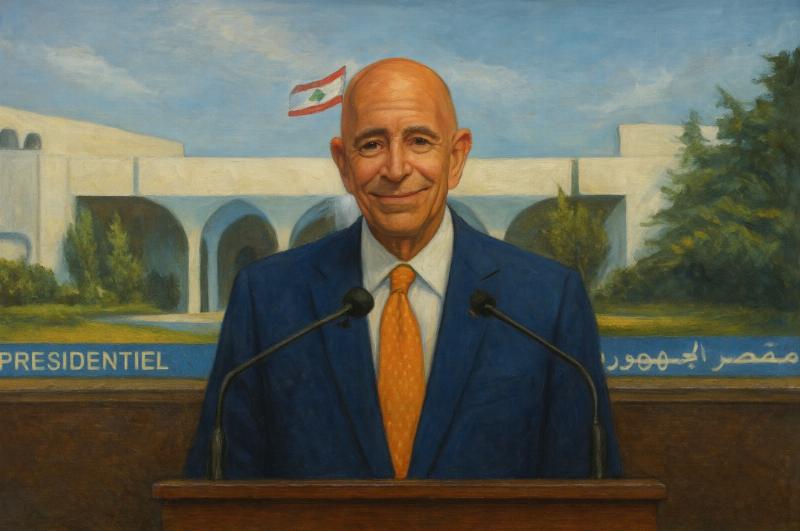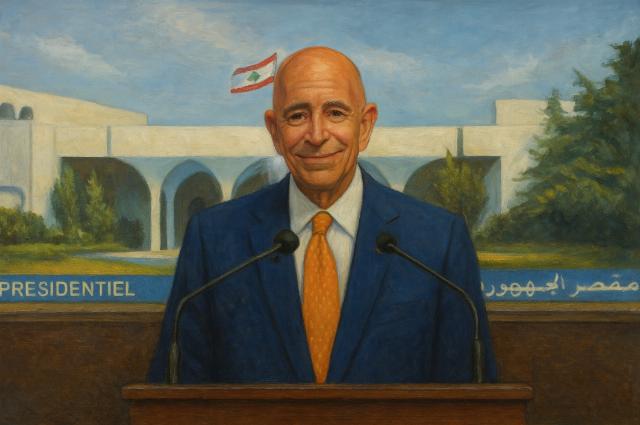


President Donald J. Trump is back in the White House, elected for a second term on the promise of restoring American strength abroad and putting U.S. interests first. That promise—America First—wasn’t just a slogan. It was a doctrine. A worldview. A call for clarity, strength, and unapologetic defense of American interests, especially in the world’s most volatile regions.
That makes it all the more baffling that one of Trump’s key diplomatic appointees, Tom Barrack, the U.S. Ambassador to Turkey and Special Envoy to Syria, is out in the world speaking and acting more like a Biden-era bureaucrat than a trusted Trump official.
His most recent visit to Lebanon on July 21, 2025, makes the problem plain. According to a series of updates from sources in Beirut, as reported in Al Arabiya, Barrack’s trip accomplished exactly nothing. “He did not offer anything new and did not take anything new,” one source said flatly. Another warned, “The current state of procrastination opens the door to military escalation.” Meanwhile, Hezbollah is maneuvering to shift blame to the Lebanese government, Israel is refusing concessions, and the U.S.—through Barrack—is offering vague platitudes rather than decisive leadership.

Image created by ChatGPT.
This is not a Trumpian foreign policy. It’s State Department inertia, reheated from the Obama-Biden years.
A Hollow Visit Amid a Growing Crisis
The crisis in Lebanon is reaching a boiling point. Hezbollah continues to operate as a state within a state, dragging Lebanon closer to confrontation with Israel. Iranian weapons, regional provocations, and an emboldened terror infrastructure are pulling the Levant toward war. In this context, Barrack’s soft-touch diplomacy isn’t just ineffective, it’s dangerous.
Even the reports confirm it: after Barrack’s third visit, there’s “nothing new.” No new leverage. No pressure. No consequences. This is a far cry from the approach of Morgan Ortagus, the former Deputy Special Envoy for the Middle East, who made it clear that U.S. support came with conditions. Under Ortagus, Lebanese leaders knew backing wasn’t a blank check for corruption or Hezbollah’s armed expansion. They felt the weight of American resolve.
Replacing Ortagus with Barrack—who rules out sanctions, treats Hezbollah’s arms as an “internal issue,” and promises Lebanon that the U.S. will “never abandon” them—is baffling at best and disastrous at worst. It’s a tacit green light for kleptocrats and terror proxies alike to continue business as usual, risking another conflagration without fear of consequence.
Instead of drawing clear red lines, confronting Iran’s proxies, or backing Israel’s right to defend itself, Barrack’s visit amounted to a photo op with recycled talking points. There was no pressure on Hezbollah. No tough message for Tehran. No commitment to strategic deterrence.
If anything, the trip felt more like an Anthony Blinken tour than a Trump administration mission.
So the question practically writes itself: Why is Barrack operating like he’s still taking direction from Foggy Bottom’s old guard?
The Syria Ceasefire: A Case Study in Diplomatic Drift
This isn’t the first time Barrack has raised eyebrows. His earlier announcement of a ceasefire agreement in Syria—brokered with Israeli Prime Minister Netanyahu, Syrian President Ahmed al-Sharaa, and backed by Turkey and Jordan—sounded like something out of the United Nations, not the Trump administration.
In a now widely circulated statement, Barrack called upon “Druze, Bedouins, and Sunnis to put down their weapons and together with other minorities build a new and united Syrian identity in peace and prosperity.” That might sound nice on paper, but to anyone who understands the real dynamics on the ground, it’s tone-deaf at best, and reckless at worst.
Laura Loomer: Saying What Others Won’t
Conservative firebrand Laura Loomer didn’t hold back. In a now-viral X post, she questioned how Barrack could push for disarmament among vulnerable groups like the Druze while jihadist factions still control swaths of Syria:
Notice how @marcorubio addresses the Islamic jihadist violence in Syria head on, calling it JIHADI VIOLENCE.
— Laura Loomer (@LauraLoomer) July 20, 2025
How come Tom Barrack @USAMBTurkiye didn’t do the same? Why does Barrack want to play footsie with Islamic terrorists at the expense of non-Muslims?
He is very naive. I… https://t.co/sJmDP4XwMM pic.twitter.com/018IJxvOAV
Why does Barrack want to play footsie with Islamic terrorists at the expense of non-Muslims?
[snip]
Is he retarded? It has to be asked.
[snip]
This is an embarrassment to the Trump administration.
While Loomer’s language may be blunt, the substance of her critique hits hard. She’s voicing what many on the right are starting to notice: Tom Barrack’s policies don’t reflect the Trump worldview. They echo something else. Something softer. Something more aligned with the institutional globalism Trump was elected—twice—to reject.
The Biden Bureaucrats Still in the Room
It’s not just Barrack’s rhetoric that raises concerns. It’s the people behind the scenes. Career bureaucrats in the State Department—many of whom served under Biden—never left. They’re still drafting talking points, running diplomatic backchannels, and steering policy behind closed doors.
Ask yourself: how else does a Trump-appointed envoy end up repeating the same tired phrases about “unity,” “regional cooperation,” and “peaceful coexistence” with Islamic militias who have zero intention of peace? How else does a supposedly America First diplomat avoid even naming Islamic terrorism as the enemy?
It’s not just mission creep. It’s ideological capture.
Trump’s Legacy Deserves Better
Let’s remember what President Trump’s first-term foreign policy actually looked like:
Barrack’s current trajectory undermines that legacy. Worse, it puts American interests and America’s allies at risk.
If Trump’s name is on the door, then those inside that door need to reflect his agenda. Not the same globalist groupthink that led to endless wars and strategic failure.
A Time for Course Correction
It’s not too late, but Trump had better reassess the situation quickly. He has a rare second-term opportunity to cement his foreign policy doctrine for good. That means surrounding himself with people who reflect his instincts, not people who cater to the permanent diplomatic class.
Tom Barrack is a longtime friend of President Trump, and loyalty is important. But friendship can’t come at the expense of American security and influence. If Barrack can’t deliver on these crucial hotspots, then maybe his skills are better suited for somewhere less demanding—say, Monaco—not the volatile front lines of the Middle East.
Barrack’s recent behavior is a wake-up call. His language, his hesitation, and his policies don’t reflect America First. They reflect the same status quo machinery that Trump was elected to dismantle.
If the Trump administration wants to project strength in the Middle East, it needs to start by ensuring its envoys speak like Trump, act like Trump, and negotiate like Trump.
Right now, Tom Barrack isn’t doing any of those things.
